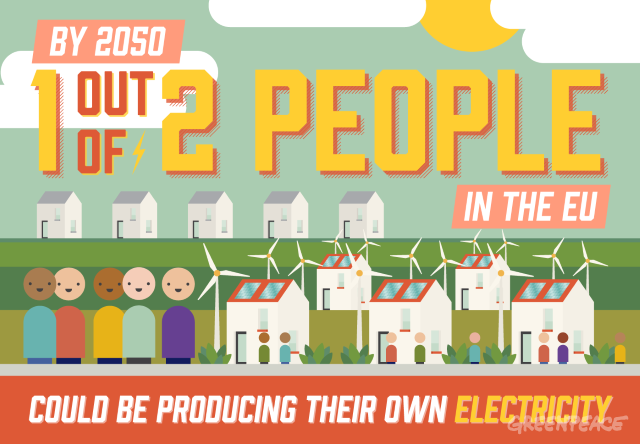Brussels – Over half of citizens in the European Union could be generating their own renewable electricity by 2050, according to new research released today.
The research outlines the potential for citizen-owned renewable energy projects in Europe, where 264 million “energy citizens” could generate 45% of the European Union’s electricity needs by 2050 – as part of a democratised energy system. [1]
Molly Walsh, community power campaigner for Friends of the Earth Europe, said: “This shows that people have the power to revolutionise Europe’s energy system, reclaiming power from big energy companies, and putting the planet first. We need to enshrine the right for people to produce their own renewable energy in European and national legislation.”
Tara Connolly, energy policy adviser for Greenpeace EU, said: “The EU should be clearing a path for forward-thinking, nimble energy citizens, not supporting big, polluting utilities. The age of energy dinosaurs is over.”
Dirk Vansintjan, president of REScoop.eu, said: “Citizens are already playing a role in renewable energy projects across Europe – benefiting the local economy, as well as creating public support for the energy transition. Their potential is huge, and this research shows these projects could, and should, be the norm.”
The organisations are calling for a framework to protect, support and promote energy citizens at the core of the European Commission’s Energy Union package – specifically as part of the revised Renewable Energy Directive and the Market Design Initiative. This call is in line with President Juncker’s stated objective for “the EU to become the world number one in renewable energies” and with the European Commission’s vision of “an Energy Union with citizens at its core”.
Contacts:
Tara Connolly, Greenpeace EU energy policy adviser: +32 477 79 0416, [email protected]
Notes:
[1] For the purposes of the report, energy citizens are defined as individuals or households producing renewable energy or managing their electricity demand flexibly either individually or collectively. The definition also includes public entities such as cities and municipal buildings, schools, hospitals or government buildings, as well as small businesses with fewer than 50 employees. Examples include solar panels on the roof of a home or small business, or participation in a collective wind or solar farm project.
For breaking news and comment on EU affairs: www.twitter.com/GreenpeaceEU
Greenpeace is an independent global campaigning organisation that acts to change attitudes and behaviour, to protect and conserve the environment and to promote peace. Greenpeace does not accept donations from governments, the EU, businesses or political parties.

